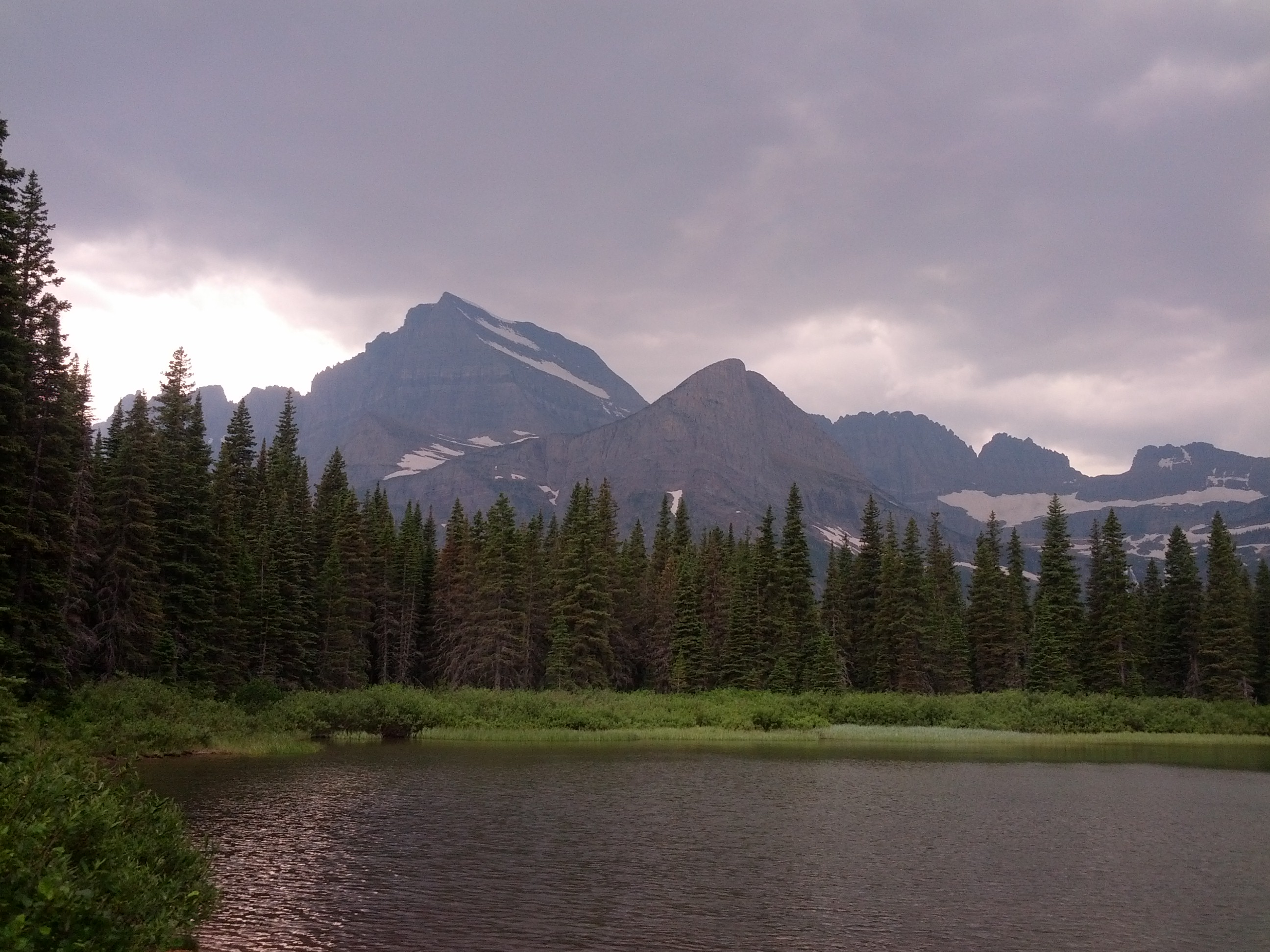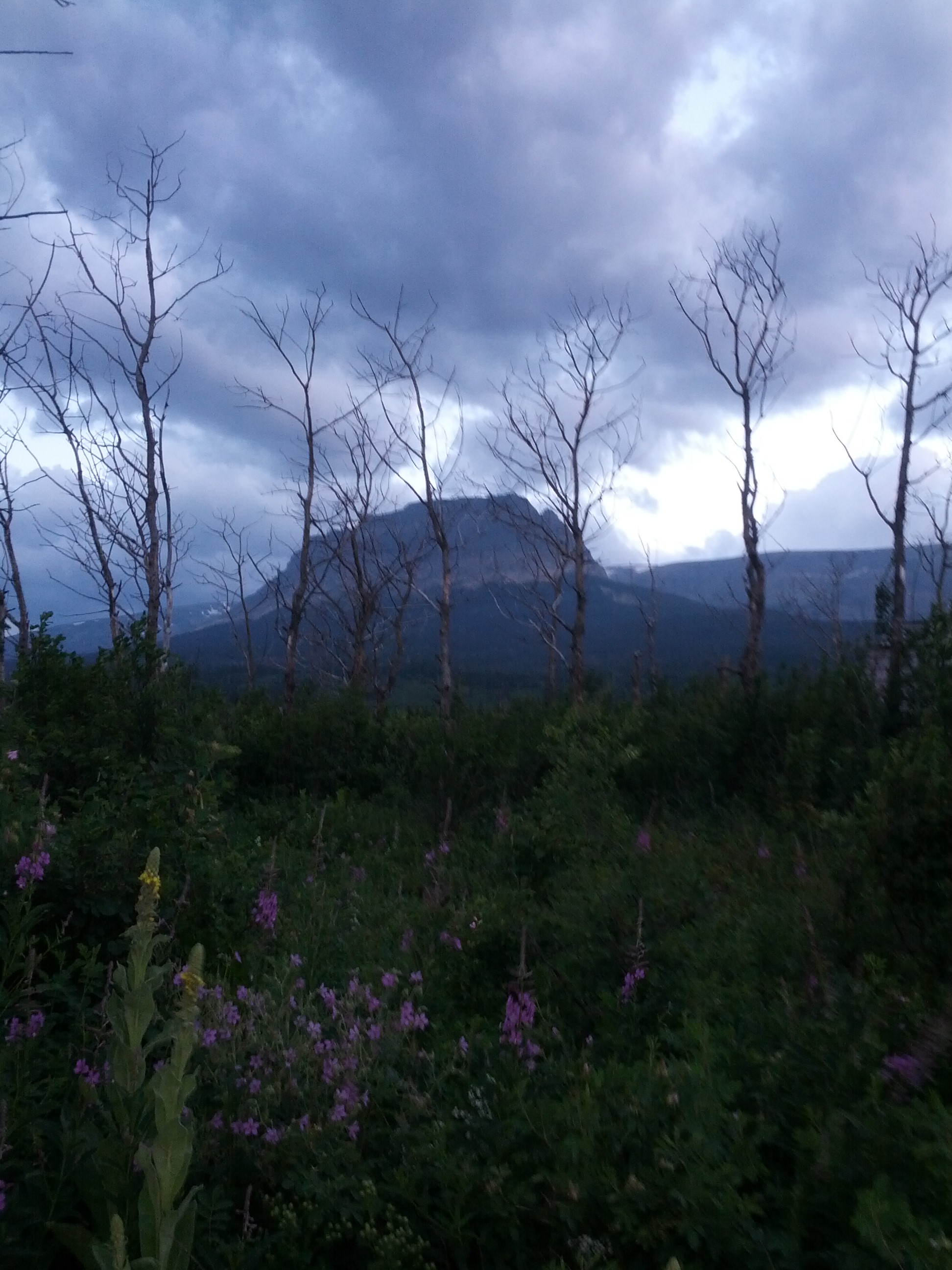
For over a quarter of a century, a modern day Blackfoot troubadour takes the stage at rotating lodges in Glacier NP a few nights a week to bring the “Native America Speaks” show to park visitors. Jack Gladstone was one of the co-founders of this program, which is now celebrating its thirtieth season. His “Buckskin Poet” routine combines song, oral tradition, and lyrical poetry to share the stories of the Old West, celebrating his Native American heritage as well as famous figures of the time.
This program was one I was looking forward to during our visit, and although it caused us a mild amount of stress to finish our activities in time to make the long drive back to Many Glacier Lodge from our campsite, get the cash for the tickets, and get to the show on time, I was not disappointed in the end result.
We didn’t take any photos of the performance, but you can imagine how this goes: a one-man show, guitar hanging across his shoulder, with a powerpoint showing us illustrations that went along with the stories he told. In his poetry, Gladstone struggles to keep alive the oral traditions of his people and make the past come alive for those of us who have forgotten the details from history class. He tells stories about the people who first lived in this area, and what their names were for some of the landmarks and animals of this place. His stories about Lewis and Clark, C.M. Russell, his family’s heritage, and the place the buffalo held in their life stuck with me the longest, and I thought about what he said for weeks afterwards. He mentions the conspiracy of Civil War generals after the war to increase demand for buffalo from whites in order to justify their killing, in order to bring down the red man that were unable to be brought down by General Custer. He explained that when Lewis and Clark came over central Montana in 1805, the buffalo roaming the plains numbered around 40 million, and in less than 100 years, by 1899, their numbers were down to 1141.
I felt inspired enough by the words he spoke to write some of my own thoughts over the next day or two, as we made our way south through Montana to Colorado and on to Oklahoma. These are below, under a last parting shot of the Many Glacier area. Some mention animal encounters we had over those next two days, and none mention the two most hilarious events that happened during Gladstone’s talk (but perhaps the latter are left better unsaid).

Gone
Brother Buffalo, shaggy head
Where have all your places gone?
Yellowstone the only place left
That you can truly call your home
Lewis and Clark called your name
Pointed out your complete dominion
Over north central plains
And no one can deny your prime spot
In the center of early American life
But then the white man used you up
Cut you down
The plains where you used to roam
Some forty million strong
Now fatten cows
Grass falling flat under the thresher’s cut
Rolled into big bales
To feed America’s replacement stock
And now you stare at us
From Charles Russell prints
Scenes from Montana murals
Metal silhouettes on hillsides
In your shape
A tribute to what was
What will never be again
The Wild
We fenced it in
Gated it
Paved roads through it
But when night falls
This land still belongs to you,
Little Sister Skunk
Trolling midtown Moab gardens
Silent Wolf
Flitting through Montana woods
Slow and careful Moose
At the forest’s edge
Furtive Badger
Gliding through Utah meadows
Mangy coyote and lame wolf
Nothing left to eat in
rolling Wyoming plains
Since we removed the buffalo
And replaced them with
the Fattened Calf,
Protected
Legacy
Meriwether Lewis, with his journals
His friend William Clark
Commissioned to explore the west
Find a way, stake a claim
Forge maps and reports,
Were largely forgotten for
One hundred years
Then brought back to life
Recorded in history books
Celebrated in roadside signs
Historical markers
Would Lewis and Clark even recognize this place?
The west is still wild
Make no mistake
Despite our settlements
Towns, cities, roads and stores
There are still a lot of wild spaces
Great open plains
Dark wooded forests
Chunks of time and space
Where cell phones sit useless
In our laps, no service
But those mountain passes
Which cost them so much grief
Places like Lolo Creek
Where their horses
Fell down mountains
And some had to be eaten
Now have roads going through them
The way has been made easy
Ancestral ghosts still linger, though
And their stories are still being told
By Blackfoot oraters
And celebrated in historical displays
This mark they made
Would Lewis and Clark even recognize this fame?